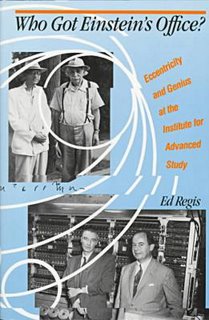 The most recent stop in the random book-reading game was Who Got Einstein's Office? Eccentricity and Genius at the Institute for Advanced Study by Ed Regis (1987). I bought this book a year ago or so -- the Institute for Advanced Study comes up a lot in my mathematical archives work, and this looked like a readable and informal history of the place. Of course, after buying it, all my other books looked much more interesting and approachable. Then my new random book reading plan took hold and this guy bumped up to the top of the list.
The most recent stop in the random book-reading game was Who Got Einstein's Office? Eccentricity and Genius at the Institute for Advanced Study by Ed Regis (1987). I bought this book a year ago or so -- the Institute for Advanced Study comes up a lot in my mathematical archives work, and this looked like a readable and informal history of the place. Of course, after buying it, all my other books looked much more interesting and approachable. Then my new random book reading plan took hold and this guy bumped up to the top of the list.The Institute for Advanced Study was established in Princeton, New Jersey in the thirties by a educational reform specialist and a wealthy brother and sister with a ton of money from the sale of the family department store business just before the stock market crash. It is dedicated to the "disinterested pursuit of knowledge" -- there are no labs, no experiments, and no equipment. Just a lot of blackboards, desks, books, and thinkers. The Institute is set up with a small, permanent faculty, and a rotating set of one and two year "worker" appointments. No one has to teach, publish, or produce anything. They just think and write about things that are so small or so big that you can't see them, you can only write equations to predict what they might be like. They get to eat at the (apparently really awesome) IAS cafeteria and live in the on-site housing. There are lovely woods surrounding the campus that are perfect for thoughtful walks.
 Einstein was the first permanent faculty member, and he stayed at the Institute until his death. In fact, the picture above of Einstein's office was taken shortly after his death and is just like he left it. So who got his office? This is answered pretty quickly -- first an astronomer, then a mathematician. Its still in use and hasn't been preserved as a shrine or anything like that.
Einstein was the first permanent faculty member, and he stayed at the Institute until his death. In fact, the picture above of Einstein's office was taken shortly after his death and is just like he left it. So who got his office? This is answered pretty quickly -- first an astronomer, then a mathematician. Its still in use and hasn't been preserved as a shrine or anything like that. This book was very readable and interesting. Because the Institute is pretty far-reaching in its pursuit of knowledge, the book is a little all over the place. You get a nice smattering of biographical and personality profiles of major scientists (Goedel, Einstein, Oppenheimer), a gloss over some major mathematical and physical theories (superstring theory, Cantor sets, cellular automata), and a look into some of the politics, advantages, and disadvantages of the Institutes system. Since the book was written in the late eighties, some of the "cutting-edge" information is outdated. The author also has an irritating habit of trying to informalize his prose to the point of calling John von Neumann "good time Johnny" ("Johnny" is pictured here with the computer he invented while at the IAS) and referring to J. Robert Oppenheimer as "Oppie."
This book was very readable and interesting. Because the Institute is pretty far-reaching in its pursuit of knowledge, the book is a little all over the place. You get a nice smattering of biographical and personality profiles of major scientists (Goedel, Einstein, Oppenheimer), a gloss over some major mathematical and physical theories (superstring theory, Cantor sets, cellular automata), and a look into some of the politics, advantages, and disadvantages of the Institutes system. Since the book was written in the late eighties, some of the "cutting-edge" information is outdated. The author also has an irritating habit of trying to informalize his prose to the point of calling John von Neumann "good time Johnny" ("Johnny" is pictured here with the computer he invented while at the IAS) and referring to J. Robert Oppenheimer as "Oppie."I think that most people would find this to be an interesting read, and not just math archivists and science nerds. I'd like to see an updated volume, though. I also like someone to start up an institute for me and pay me a nice salary to just sit around and think and occassionally get coffee and talk with other people who are thinking. This may or may not work for every scientist, but I think it would work well for me.
Advanced studies are just so.... advanced.
1 comment:
I'm going to start calling my professors "Good Time ______."
Post a Comment